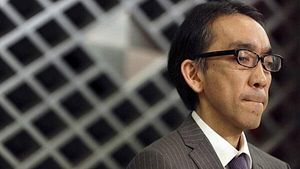Speaking at a press conference at Tokyo’s posh Hotel New Otani, 43-year-old music teacher Takashi Niigaki revealed that he was the man responsible for 18 years’ worth of classical hits credited to Mamoru Samuragochi – the man referred to as “Japan’s Beethoven.”
Niigaki, a previously unknown composer and part-time music teacher, came forward just one day after the eccentric Samuragochi admitted to using a ghost composer for the better part of the past two decades. The disgraced musician initially blamed his decision to hire Niigaki on his rapidly disintegrating health. Samuragochi claims to suffer from a host of medical conditions including deafness, severe headaches, depression and anxiety.
It was the composer’s alleged deafness that led Japanese media outlets to compare him to Beethoven – something that Niigaki has revealed to be yet another lie in Samuragochi’s web of deception.
“I’ve never felt he was deaf ever since we met,” Niigaki told reporters. “We carry on normal conversation … At first he acted to me also as if he had suffered hearing loss, but he stopped doing so eventually.”
Samuragochi had his first brush with fame in 1996 as the composer of the groundbreaking survival-horror videogame Resident Evil’s background score. According to Niigaki’s account, that’s the same year that he began penning songs under Samuragochi’s name.
“He told me, after the music for the video games was unveiled, that he would continue to play the role [of a deaf person],” Niigaki added.
For 18 years of writing successful music – including the wildly popular Symphony No. 1 Hiroshima – Niigaki was paid a paltry 7 million yen (less than $70,000). However, it seems to be a matter of national pride, not lack of compensation, that drove Niigaki to come clean.
Japanese figure skater Daisuke Takahashi is set to perform to “Sonatina for Violin,” a song written by Niigaki but bearing Samuragochi’s name, at the Sochi Winter Olympics.
“He told me that if I didn’t write songs for him, he’d commit suicide,” Niigaki said. “But I could not bear the thought of skater Takahashi being seen by the world as a co-conspirator in our crime.”
Takahashi will still use the song for his short program next week in Sochi, as it is too late to change his routine.
While Samuragochi has yet to respond to the scathing accusations, his record label – Nippon Columbia – has halted the distribution of his CDs, DVDs and digital downloads. In addition, publisher Tokyo Hustle has cancelled the release of three new Samuragochi scores and retracted permission for his existing catalog, changing the status of copyright owner to “unknown.”
Perhaps the most significant blow is from the mayor of Samuragochi’s hometown – Hiroshima.
“[Mayor] Kazumi Matsui has said that the city will have to retract the citizen’s award it had given Samuragochi in 2008,” reported NPR.
Both of Samuragochi’s parents survived the atomic bombing of 1945. His ghostwritten magnum opus was purportedly written for the victims.

































